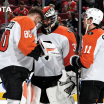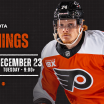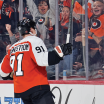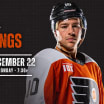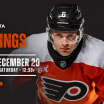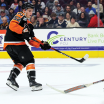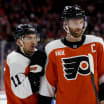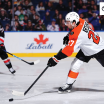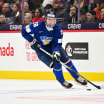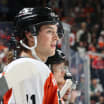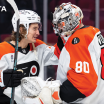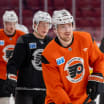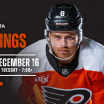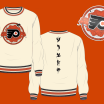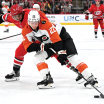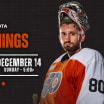This weekend, Flyers captain Claude Giroux will participate in his seventh NHL All-Star Game. He will tie Bill Barber for the second-most appearances by the Flyers' representative, surpassed only by Bobby Clarke's 10 selections . Giroux's participation will mark yet another milestone in his career. The following is retrospective on 12 of the most notable NHL All-Star moments and accomplishments across the Flyers' organizational history.
Top 12 Flyers All-Star Game Moments
This weekend, Flyers captain Claude Giroux will participate in his seventh NHL All-Star Game.
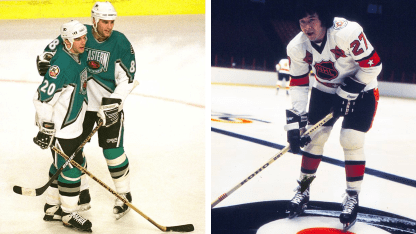
By
Bill Meltzer
philadelphiaflyers.com
1968: Leon Rochefort named Flyers' first All-Star
Held in Maple Leaf Gardens in Toronto, the 1968 NHL All-Star Game was the final one played under the format of the defending Stanley Cup champion playing a visiting team composed of top players from the other NHL teams. It was the first All-Star Game played after the NHL expanded from six to 12 teams.
The All-Star Games of yesteryear had little resemblance to the glitz and entertainment-oriented focus of latter-day events. Back then, the games were often fairly low-scoring and physical contests with an emphasis on winning. The defending champions, playing on their home rink, took pride in defeating the All-Star team or vice versa. Players doled out -- or received -- body checks and after-the-whistle tensions were not uncommon.
Flyers All-Star Moments: 1968
— Flyers Alumni (@FlyersAlumni) February 4, 2022
Leon Rochefort is selected as the Flyers' lone representative at the 1968 NHL All-Star Game in Toronto. pic.twitter.com/qyeu4tDkRS
Every NHL team had at least one representative. Coached by the legendary Toe Blake (Montreal Canadiens), the NHL All-Star roster had one player apiece from each of the six expansion clubs and two or more from each of the five other pre-expansion clubs of the so-called Original Six.
Twenty-nine-year-old Flyers right winger Leon Rochefort represented Philadelphia. Earlier in the season, on Nov. 4, 1967, the Quebec native and former Canadiens player scored three goals (the first hat trick in Flyers history) when the visiting Flyers stunned the mighty Canadiens with a 4-1 upset at the Montreal Forum. Rochefort went on to lead the Flyers with 21 goals during the club's inaugural season.
The 1968 All-Star game was played on Jan. 16, 1968. The Maple Leafs defeated the All-Stars, 4-3. Bobby Orr sustained a broken collarbone after crashing awkwardly on a hit by Toronto's Pete Stemkowski. Rochefort, who skated on a line centered by the legendary Jean Beliveau.
2. 1970: Clarke's first All-Star Game
The 1970 NHL All-Star Game was held at St. Louis Arena on Jan 20, 1970. For the first time, the Flyers had two players in the game. For the second straight year, goaltender Bernie Parent was chosen to represent the Flyers. He was joined by rookie center Bobby Clarke. Clarke would go on to play in 10 All-Star Games; a Flyers franchise record. Fellow future Hockey Hall of Fame and NHL 100 honoree Parent played in five All-Star Games during his two-stint playing career in the orange and black.
Flyers All-Star Moments: Bernie Parent and Bobby Clarke at the 1970 NHL All-Star Game in St. Louis. pic.twitter.com/uPE4iqXSHG
— Flyers Alumni (@FlyersAlumni) February 4, 2022
In the 1970 game, the East Division All-Stars (teams from the Original Six) defeated the Western Division All-Stars (expansion team players) by a 4-1 score. Parent split the goaltending duties for the West team with his childhood idol and future mentor, Jacques Plante. Scotty Bowman coached the Western Division squad, which had six of Bowman's players from the St. Louis Blues on the roster.
3. 1972: Nolet scores first Flyers All-Star goal
The Flyers had two representatives at the 1972 All-Star Game at the Metropolitan Sports Center in Bloomington (home of the Minnesota North Stars). The game was played on Jan. 25, 1972. Clarke was chosen to play for the Western Division All-Stars for the third straight year. This time, he was joined by Flyers teammate Simon Nolet.
A goal by Chicago's Bobby Hull established a 1-0 lead for the West side in the first period. At 1:11 of the second period, Nolet made it 2-0 for the West. The goal was assisted by Chicago's Dennis Hull. Nolet's tally was the first point recorded by a Flyers representative at the annual event.
Flyers All Star Moments: 1972
— Flyers Alumni (@FlyersAlumni) February 4, 2022
Simon Nolet becomes the first Flyers All-Star Game participant to score a goal. pic.twitter.com/WAH8LgkDhk
The East Division battled back to tie the game at 2-2 by the end of the second period. In the third period, the game went to the final minute of regulation still knotted at 2-2 when Minnesota North Stars defenseman Doug Mohns was called for a penalty. Phil Esposito proceeded to win the ensuing faceoff and moments later, knocked home a Dallas Smith rebound to win the game, 3-2, with a goal at 19:16 of the third period.
4. 1976: Bicentennial All-Star Game at the Spectrum
Philadelphia has hosted the NHL All-Star Game twice: in 1976 (as a nod to the United States bicentennial year) and in 1992 (Flyers' 25th anniversary season). The 1976 game, hosted by the two-time defending Stanley Cup champion Flyers, was played at the Spectrum on Jan. 20, 1976. Nine days earlier, the Flyers had claimed their landmark 4-1 victory over the Red Army team in the same building.
Flyers All-Star Moments: 1976 All-Star Game at the Spectrum. Reggie Leach was one of six Flyers to play in the game. pic.twitter.com/jNvw5OegA7
— Flyers Alumni (@FlyersAlumni) February 4, 2022
The Flyers were thoroughly represented in this All-Star Game, as befitting of the team having won the championship each of the two previous years and being in first place of the Patrick Division at midseason of the 1975-76 campaign. Flyers head coach Fred Shero was behind the bench for the Campbell Conference. The Campbell Conference All-Star roster included Bill Barber, Reggie Leach, Rick MacLeish, defensemen Jim Watson and Andre "Moose" Dupont as well as goaltender Wayne Stephenson. Note: Clarke was selected as a starter but was unable to play. MacLeish replaced him on the final roster.
The Wales Conference All-Star side prevailed in this game, 7-5. The Campbell side scored four unanswered goals in the third period but it wasn't enough.
5. 1977: Watsons invade Vancouver
Flyers Hall of Fame defensemen Joe and Jim Watson were teammates on the teams' 1974 and 1975 Stanley Cup championship winning squads. Additionally, younger brother Jim played in five NHL All-Star Games while Joe played in two. The only time both Watsons played in the same All-Star Game took place in 1977 when the game was held in Vancouver, BC.
Flyers All-Star Moments: 1977
— Flyers Alumni (@FlyersAlumni) February 4, 2022
Smithers, BC natives Joe (right) and Jim Watson with their father, Joe Sr., at the 1977 NHL All-Star Game in Vancouver. pic.twitter.com/hyVpEMt2Iv
This was a special night for the entire Watson clan. Hailing from the small northern British Columbia hamlet of Smithers, the Watsons brothers had a slew of friends and relatives make the trek to Vancouver for the 1977 NHL All-Star Game at Pacific Coliseum (Jan. 25, 1977). Among the attendees were their mother, Mary Watson, her ex-husband Joe Sr. and Joe and Jim's four brothers.
Shero once again was behind the bench for the Campbell Conference All-Stars. In addition to the Watson brothers, participating Flyers included forwards Clarke, MacLeish, and Gary Dornhoefer, goaltender Parent and defenseman Tom Bladon. The Wales Conference won the game, 4-3, as Buffalo Sabres standout Richard Martin tallied the winning goal with 1:56 remaining in the third period.
6. 1979 Challenge Cup (NHL All-Stars vs. Soviet Union)
In lieu of a traditional All-Star Game in 1979, the NHL selected an All-Star team to play against the Soviet Union's national team in a series of three games at Madison Square Garden (Feb. 8, 10 and 11). Among the players selected to represent the National Hockey League were Flyers' players Clarke and Barber.
The mid-season international series turned out to be a bitter disappointment for the NHL side. The Soviet team, which played and trained together year-round, showed better cohesion than their NHL counterparts over the course of the series.
Flyers All-Star Moments: 1979
— Flyers Alumni (@FlyersAlumni) February 4, 2022
Bobby Clarke and Bill Barber represented the NHL All-Stars in the 1979 Challenge Cup series against the Soviet Union at Madison Square Garden. Both featured prominently in the NHL's lone win of the three-game set. pic.twitter.com/JJAFRUo7br
The NHL All-Stars prevailed in the first game, 4-2. Clarke set up a goal by Montreal's Guy Lafleur just 16 seconds into the first period. Barber, who was deployed on a checking line by coach Scotty Bowman, assisted on a late first-period goal by Bob Gainey to give the NHL side a 3-1 lead. All scoring for both teams took place in the first period. Goalie Ken Dryden and the NHL team made a 4-2 edge hold up for the final 40 minutes.
The second game was largely controlled by the Soviets (who outshot the NHL All-Stars by a 31-16 margin for the game). However, the contest was up for grabs on the scoreboard as it entered the third period tied at 4-4. The Soviets forged ahead, 5-4, just 91 seconds into the third period and then played keep away as the NHLers chased in vain and were held to six shots over the final stanza.
In the deciding game, the contest was scoreless for the first 25 minutes. The Soviets then struck for two closely spaced goals, and took a 2-0 lead into the third period. The NHL side panicked and started to make low-percentage plays on both sides of the puck. The Soviets then opportunistically picked apart the NHL's best players for four additional unanswered goals on the way to a 6-0 victory to claim the Challenge Cup in New York City.
While the Challenge Cup tournament did not measure up to the 1972 Summit Series or some of the best years of the Canada Cup/ World Cup of Hockey tournaments, it was a reminder to the NHLers that they had to at their best as a cohesive squad to beat the USSR. The Soviets' humiliation of the NHL All-Stars in Game 3 in particular also served to underscore how aptly dubbed the Miracle on Ice at the 1980 Winter Olympics in Lake Placid truly was when a group of American collegiate players defeated the Soviets and went on to capture the gold medal.
7. 1980: Seven Flyers All-Star reps
Right up until the New York Islanders' highly controversial series-clinching overtime victory in Game 6 of the 1980 Stanley Cup Final, the 1979-80 campaign seemed to be a charmed year for the Philadelphia Flyers.It was the year of the team's North American professional sports record 35-game unbeaten streak.
Flyers All-Star Moments: 1980 (Detroit)
— Flyers Alumni (@FlyersAlumni) February 4, 2022
In the season of the Flyers' 35-game unbeaten streak, a record seven Flyers players -- Peeters, Jim Watson, Barnes, Propp, Barber, MacLeish and Leach -- were selected to the Campbell Conference All-Stars in 1980. pic.twitter.com/7bqHfoCWZb
At midseason, seven different Flyers players were selected to participate for the Campbell Conference team at the 1980 NHL All-Star Game at Joe Louis Arena in Detroit: rookie goalie Pete Peeters, defensemen Jim Watson (in his fifth and final All-Star selection) and Norm Barnes, rookie Flyers left wing Brian Propp and veteran Flyers forwards Barber, Leach and MacLeish.
The Wales Conference All-Stars won the game, 6-3, after the game entered the third period tied at 2-2 and the Campbell side took a short-lived lead. Despite the loss, Leach was selected as the game's MVP. The "Riverton Rifle" tallied a first period goal for the Campbell side and later assisted on Propp's go-ahead goal in the third period. \
Flyers players figured in all three goals for the Campbell Conference All-Stars. MacLeish assisted on a Kent Nilsson goal in the middle stanza, which made it a 2-2 score at the time. Peeters played 44:50 of the game in goal after replacing starter Tony Esposito.
8. Rendezvous '87
The NHL decided to forgo the traditional All-Star Game in 1987 in favor of another set of games pitting an NHL All-Star team against the Soviet national team. The venue shifted this time to Le Colisée in Quebec City for a two-game set on Feb. 11 to 13, 1987. Two Flyers players -- Hockey Hall of Fame defenseman Mark Howe and Selke Trophy winning center Dave Poulin were selected to the NHL All-Star roster. However, Norris Trophy runner-up Howe was dealing with a slipped disc in his lower back at the time and was unable to participate in the Rendezvous '87 series. Flyers rookie goaltender Ron Hextall and ailing perennial 50-plus goal sniper Tim Kerr were chosen as reserves for the NHL side but neither dressed in the series. As a result, Poulin was the lone Flyer to appear in the series.
Game One was a thriller, entering the late stages of the third period tied at 3-3. With time ticking down below 1:20 remaining in the third period, the NHL All-Stars attacked. Mario Lemieux shot the puck toward the net and Poulin deflected it past goalie Evgeny Belosheikin for what proved to be the game-winning goal. Earlier in the third period, Poulin and Dale Hawerchuk assisted on a Kevin Dineen tally.
Flyers All-Star Moments: @djpoulin20 celebrates the winning goal of Game 1 against the Soviets at Rendezvous '87. pic.twitter.com/6DTsnvUsaT
— Flyers Alumni (@FlyersAlumni) February 4, 2022
Game Two saw Mark Messier send the NHL side to the first intermission with a 1-0 lead after potting a power play goal set up by Edmonton teammates Wayne Gretzky and Jari Kurri. Gretzky would later assist on two additional goals for the NHL All-Star squad. However, the Soviets rallied from their early deficit to take a 5-2 lead at one juncture before holding off a late push from the NHL side to prevail, 5-3. Vladimir Krutov scored twice for the Soviets in achieving a split of the two-game series.
In September of the same year, the 1987 Canada Cup series took place. Many consider the latter tournament, ultimately won by Team Canada, to be the best international hockey competition of all-time. The Rendezvous '87 event is primarily recalled as a preview of the drama that followed eight months later.
9. 1992 All-Star Game at the Spectrum
The National Hockey League All-Star Game returned to the Spectrum in 1992 as part of the leaguewide celebration of the 25th anniversary season since the 1967 expansion. The festivities included a game between the Flyers Alumni Team and a team of NHL Alumni. Bob Clarke, at the time the general manager of the Minnesota North Stars, received a standing ovation from the Spectrum when introduced during the All-Star events as the honorary captain of the Wales Conference team. In the All-Star Game the Flyers were represented by Rod Brind'Amour, who received the largest ovation during the Skills Competition the previous evening. Brind'Amour scored a goal during the climactic breakaway relay. In the All-Star Game itself, the Wales Conference prevailed by a 10-6 score.
Flyers All-Star Moments: 1992 All-Star Game at the Spectrum
— Flyers Alumni (@FlyersAlumni) February 4, 2022
Rod Brind'Amour represented the Flyers in the ASG. Bob Clarke served as honorary captain of the Wales Conference All-Stars. pic.twitter.com/3renI3oDUA
10. 1993: Recchi's five-point All-Star Game
During the 1992-93 season, Flyers right winger Mark Recchi set a franchise single-season record by racking up 123 points (53g, 70a). He also featured prominently in the Wales Conference's 16-6 blowout of the Campbell Conference at the 1993 NHL All-Star Game at the Forum in Montreal. Recchi racked up one goal and four assists in the game. He scored a mid-game goal assisted by Commisioner's Selection Brad Marsh (Ottawa Senators) and later assisted on a rare Marsh goal among the five points Recchi collected in the game. Recchi's other points were assists on tallies by Pierre Turgeon, Rick Tocchet (who had been traded by the Flyers to the Penguins one season earlier in the deal that brought Recchi to Philadelphia for the first of two stints), and Kevin Stevens.
Flyers All-Star Moments: 1993
— Flyers Alumni (@FlyersAlumni) February 4, 2022
Mark Recchi's five-point game (1g,4a) set a Flyers record for points in an All-Star Game. The mark was later broken by Jakub Voracek (3g, 3a) in 2015. pic.twitter.com/HwVEh0jLda
11. 1997: Four Goals by Flyers reps
Flyers representatives accounted for four of the 11 goals scored by the Eastern Conference All-Stars in an 11-7 victory over the Western Conference All Stars at the 1997 game played at San Jose Arena. Legion of Door left winger John LeClair notched the first and the 11th goals scored by the East, and also earned an assist. Eric Lindros did not score a goal in the game but set up goals for Flyers teammate Dale Hawechuk as well as Geoff Sanderson. Hawerchuk, a Commissioner's Selection in the final season of his Hockey Hall of Fame career, scored a pair of goals. LeClair and Scott Stevens assisted on the latter. The Flyers were also represented in this All-Star Game by veteran defenseman and subsequent Hockey Hall of Fame inductee Paul Coffey.
Flyers All-Star Moments: 1997
— Flyers Alumni (@FlyersAlumni) February 4, 2022
The Flyers were represented by Eric Lindros (2a), John LeClair (2g,1a), Dale Hawerchuk (2g) and Paul Coffey in the 1997 ASG in San Jose. pic.twitter.com/hodcPNuHS3
12. 2017: Simmonds wins MVP Honors
Amid the organization's celebration of its 50th anniversary season, Flyers power forward Wayne Simmonds was selected as the team's lone representative at the 2017 NHL All-Star Game at the Staples Center in Los Angeles. The All-Star Game, for the second time, was conducted via a 3-on-3 tournament format with teams representing each of the NHL's four divisions. Team Metro Division won the tourney with a 10-6 victory over the Atlantic Division All-Star in the preliminary round and then a 4-3 conquest of the Pacific Division in the final game. Simmonds, who began his NHL career with the LA Kings, was selected as the Most Valuable Player, as he scored three goals in the mini-tourney. Two years earlier, Voracek established a Flyers record with a three-goal, three-assist showing in the 2015 All-Star Game in Columbus.
Flyers All-Star Moments: 2017
— Flyers Alumni (@FlyersAlumni) February 4, 2022
Wayne Simmonds earned MVP honors at the 2017 NHL All-Star Game in Los Angeles. pic.twitter.com/5VKPMaQWfp

